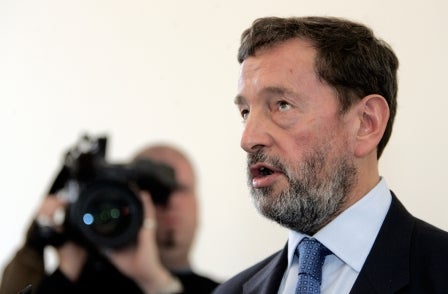
Police should not use eavesdropping powers to interfere with the work of journalists, former home secretary David Blunkett (pictured, Reuters) – who first implemented the measures – has told an influential parliamentary committee.
The need for an overhaul of the Regulation of Investigatory Powers Act was "obvious", said Blunkett.
The chair of the Equality and Human Rights Commission told the same committee that the legislation was "time-expired" and should be replaced.
The recent furore over police accessing journalists' phone records has sparked widespread calls for urgent reform of the act, which dates back to 2000 and allows officers to request call data from phone companies without a judge's approval.
Justice minister Simon Hughes last weekend promised reform to prevent the "entirely inappropriate" use of surveillance powers to target reporters' sources.
Blunkett told the Parliamentary Intelligence and Security Committee: "RIPA should not be used to interfere with the normal activities of the journalistic profession."
The act was intended to "regulate and confine" police investigations rather than to open up new avenues for inquiry, said the former Labour minister, adding: "I think we need to get back to that."
He added: "The necessity to update is obvious … What we need to do is to bring it up to date and ensure that the oversight mechanisms – including returning to it in each Parliament – mean people have confidence in it."
EHRC chair Baroness O'Neill told the committee that RIPA relied on distinctions between communications data and content and between internal and external communications which had been rendered "obsolete" by technological advances.
She called for changes to give the public more information about how interceptions of phone calls and electronic communications were authorised.
"The EHRC has come to the conclusion that RIPA is time-expired and it needs to be reformed," said Lady O'Neill, who suggested that new laws should be introduced in December 2016, on the lapse of the emergency Data Retention and Investigatory Powers Act (DRIP) rushed through Parliament earlier this year.
"That is surely an opportunity to get greater clarity about the authorisation mechanisms to make it clearer for the public," she said.
"I very much agree that a great deal of this information about how it is done can perfectly well be in the public domain. They don't have to know which bit of surveillance was authorised, but that there is a process for authorising it, they can know.
"RIPA's successor needs to have simpler and clearer structures for both authorising surveillance or authorising the collection of data and for the discarding of information, and to make it clear that they need to have both the authorisation and the subsequent oversight or audit function separate and clear and independent."
EHRC chief legal officer Rebecca Hilsenrath said that privacy safeguards in RIPA were not "effectively or consistently applied", telling the committee: "The problem with RIPA is it has been superseded by technological developments. It does mean that the lawful basis on which interception must be justified is inconsistent and rather random in terms of whether a particular instance can be justified."
Lady O'Neill said that Communist East Germany's Stasi secret police "would have loved" the opportunities for intrusion made possible by modern data collection techniques.
But she made clear she was not seeking blanket protections for privacy, telling the committee she had no objection to companies using data collection to track her shopping patterns.
"If we want to have effective protection of the right to privacy, we have to re-focus ourselves on what really matters to people in terms of privacy," she said. "The (European Human Rights) Convention is not stupid in talking about the home and family and correspondence."
Blunkett said authorities had to manage the "paradox" of reassuring people that the state was not prying into their private lives at the same time that growing numbers were eager to put personal details online through social media.
"We have to deliberate and we have to be able to demonstrate that there is an absolutely overriding imperative before we intrude into people's privacy," he said.
"The emergence of online and cyber has changed, dramatically, the nature of the debate.
"I think it has done so in two ways: it has obviously, technically, made it possible to intrude in, to intercept, to be able to examine people's private data in a way that was not as obvious in the past."
"The second part of that, and I think it's a paradox, is that very many young people are prepared to give up, quite readily, their privacy in order to be able to demonstrate what they are doing in life and to communicate with their friends."
He added: "We need to be able to protect people from intrusion on privacy in terms of the data they give up to private enterprise and we need to persuade people that they need to understand and have greater information and education on what they are doing in daily life which actually then demonstrates an erosion of their own privacy.
"These things are contradictory."
Email pged@pressgazette.co.uk to point out mistakes, provide story tips or send in a letter for publication on our "Letters Page" blog
